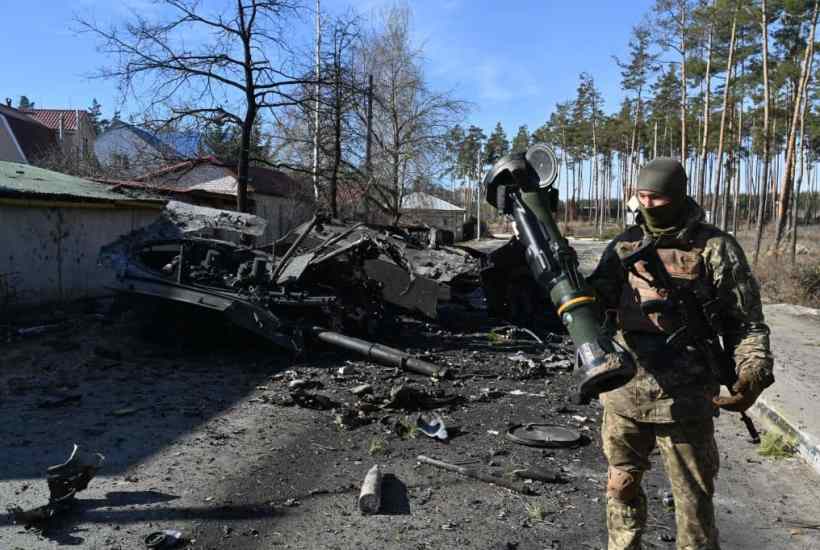Britain’s greatest war poet Siegfried Sassoon was well aware of the idiocy of those who cheered the deaths of soldiers. ‘O German mother dreaming by the fire/ While you are knitting socks to send your son/ His face is trodden deeper in the mud,’ he wrote in his World War I poem Glory of Women. His verse dealt with the hypocrisy and callousness of civilians who failed to recognise the cruel reality of war. We appear to have barely learnt a thing in relation to the war in Ukraine, as we celebrate all too readily the deaths of those on the ‘wrong side’.
On Twitter now – and throughout the media – there is a thirst for videos of Russian tanks and armoured fighting vehicles (AFVs) being blown up. Commentators take self-indulgent delight in the latest daily tally of Russian equipment losses. Yet while we all surely want Putin to be defeated, we should stop and remember the cost of war: Russian sons, brothers and fathers – most of whom are blameless; some of whom are merely conscripts deceived about the nature of the operation they were sent on – are dying in their thousands.
It brings to mind my own experience of fighting in Afghanistan, back in 2009. Each day, we watched remote feeds of air strikes on the Taliban: ghostly grey thermal figures on the computer screen tottered about before a white flash appeared on the screen. As the smoke cleared, a patch of scorched earth was all that was left; it was followed, not long after, by the appearance of other ghostly figures to pick up the pieces.
The Taliban were our enemy. But there was still little joy in taking another human life. Those cheering on the deaths of Russians should stop and reflect on this.
Squaddies sent to do Putin’s bidding appear entirely expendable to their officers and leaders. They are enduring fear and fatigue in a war that many may not believe in. ‘One thing is missing from all the media reports so far – the total absence of any understanding of what it’s like for the infantry soldier on the ground,’ James Goodwin, a former British Army officer during the Cold War, has said. He’s right.
I spent most of my military career in a comfortable Challenger 2 tank, but I spent a year as an infantryman during officer cadet training at Sandhurst. It was long enough: it involved levels of fatigue, cold and confusion you couldn’t imagine. And that was just with Gurkha soldiers role-playing as the enemy firing blanks at us.
In Ukraine, Russian soldiers appear to be out of fuel, out of food and low on morale. Regardless of whether you are on the right or wrong side, war is terrifying. Yes, Russia invaded and Ukraine has to defend itself, which means killing young Russian soldiers. But we should be capable of holding two opposing ideas in our heads at the same time without passing out: Russia’s attack is wrong; soldiers on both sides of this conflict deserve our sympathy. The more we dehumanise the enemy and cheer on the death of soldiers, the more we risk lumping people together and blaming them for the evil of Putin.
Such clumsy – and amoral – thinking isn’t the way to go about finding a solution to help end the bloodshed. We made this mistake with the Taliban. Now we are doing it again with Putin and Russia’s young conscripts. Considering how many people suddenly appear to have become military experts, they continue to miss the basic tenets of Military Strategy 101 as they pontificate on the menace of the Russian Bear. They would do well to remember advice offered across the ages, from the Chinese military strategist Sun Tzu to US defence secretary Robert S. McNamara post-Vietnam: know and empathise with your enemy.
What does it take for these lessons to finally sink in? We just had 20 years of Afghanistan and Iraq to show us the way, and all the wars before, taking us back to Sassoon. He didn’t know about social media and the internet, but he experienced the same human tendencies at play, hence his 1917 poem Blighters:
The House is crammed: tier beyond tier they grin
And cackle at the Show, while prancing ranks
Of harlots shrill the chorus, drunk with din;
‘We’re sure the Kaiser loves the dear old Tanks!’
I’d like to see a Tank come down the stalls,
Lurching to rag-time tunes, or ‘Home, sweet Home,’
And there’d be no more jokes in Music-halls
To mock the riddled corpses round Bapaume.
In that last line, substitute the French town of ‘Bapaume’ for the Ukrainian city of Kherson or Mariupol or Kiev, and there’s the point we clearly need reminding of.
Got something to add? Join the discussion and comment below.
Get 10 issues for just $10
Subscribe to The Spectator Australia today for the next 10 magazine issues, plus full online access, for just $10.



















Comments
Don't miss out
Join the conversation with other Spectator Australia readers. Subscribe to leave a comment.
SUBSCRIBEAlready a subscriber? Log in